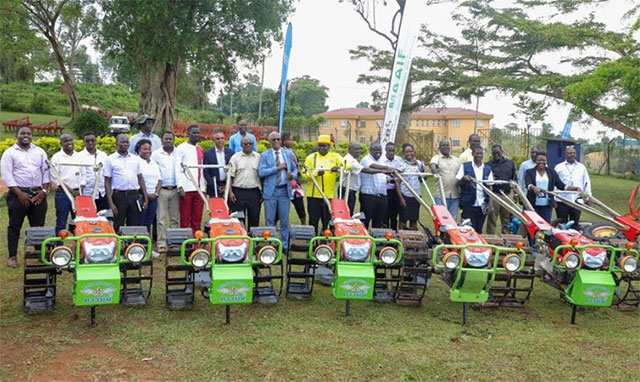
Kampala, Uganda | PATRICIA AKANKWATSA | In a bid to enhance agricultural productivity in Uganda’s Karamoja region, the Ministry of Agriculture, Animal Industry and Fisheries (MAAIF), in collaboration with the United Nations Development Programme (UNDP) and the Food and Agriculture Organization (FAO), introduced a mechanization initiative aimed at transforming subsistence farming into a more sustainable and resilient agricultural system.
Launched in 2017 under the National Implementation Modality, with the Ministry of Finance, Planning and Economic Development serving as the executive agency, the project focuses on improving environmental sustainability and the resilience of food production systems in Karamoja. Initially set to conclude in June 2022, the project has undergone several amendments and is now scheduled to end on May 31, 2025.
The initiative operates across six districts: Nakapiripirit, Moroto, Kotido, Karenga, Nabilatuk, and Kaabong. It targets 40 parishes within eight sub-counties and aims to benefit smallholder farmers by introducing mechanised farming equipment and practices.
A key component of the project is the distribution of 55 walk-behind tractors, each equipped with various attachments such as ploughs, seed planters, and trailers. These tractors are designed to be adaptable, efficient, and accessible for smallholder farmers, particularly women and youth. The mechanisation strategy emphasises commercial, environmental, and socioeconomic sustainability, aiming to improve productivity, reduce labour burdens, and support climate-resilient agricultural development.
While speaking at the handover of the equipment at the National Agricultural Mechanisation Referral Centre in Namalere, Wakiso District on Apr 14, Eng. Waneloba Francis, representing the MAAIF Permanent Secretary, emphasised the government’s commitment to improving incomes through increased production and productivity.
He highlighted the shift from pastoralism to agro-pastoralism in Karamoja, aiming to reduce animal movement, minimise conflicts, and allow crops to thrive.
“The mechanisation efforts, including providing single-axle tractors and tricycles, are part of this broader strategy to enhance agricultural productivity and sustainability in the region”.
Dr. Antonio Querido, the outgoing FAO Representative in Uganda, described the equipment as transformational, expressing confidence that mechanisation is the way forward to transform agri-food systems in Africa.
He noted that the project has already touched over 12,000 farmers and aims to tackle food insecurities in Karamoja by providing the right tools to those who will continue to work the land and feed the nation.

“This equipment will transform lives. Mechanisation is crucial for Africa’s agri-food revolution, moving beyond inefficient hand tools.”
To ensure effective utilisation of the equipment, MAAIF has conducted training sessions for local government officials and farmers. These sessions focus on the operation and maintenance of the tractors, as well as business models to promote sustainable use and income generation. The approach includes a hand-holding period during which MAAIF will support farmers until they are proficient in using the new technology.
Dr. Paul Ayella, a representative of MAAIF, highlighted the rationale behind the mechanisation efforts, stating that traditional agricultural practices relying on human and animal power are no longer sufficient to meet Uganda’s agro-industrialisation goals.
He emphasised the need for sustainable and appropriate mechanisation technology to improve productivity and support climate-resilient agricultural development.
Lotee Paul Komol, the LCV Chairperson of Kotido district, expressed heartfelt appreciation for the continued support from FAO and the Ministry of Agriculture.
“On behalf of the people of Karamoja, I sincerely thank you for the unwavering support you’ve extended to Uganda nd especially to our region. FAO has been a steadfast partner, investing in Karamoja’s growth long before I assumed office,” he said.
He also commended the Ministry of Agriculture for its pivotal role in driving development in the region.
“You are truly the backbone of Uganda’s development. Your success is not only vital to the president’s vision but also carries the hopes of Karamoja.”
The handover ceremony was part of the “Fostering Sustainability and Resilience for Food Security in the Karamoja Sub-region” (F-SURE) project, which aims to enhance agricultural productivity and resilience in Karamoja by addressing environmental challenges and promoting sustainable land management practices.
 The Independent Uganda: You get the Truth we Pay the Price
The Independent Uganda: You get the Truth we Pay the Price



